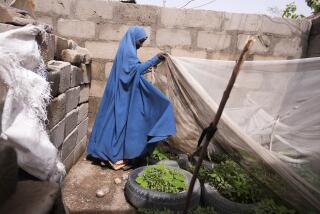Africa Grapples With Its Population Explosion : Nationsâ Leaders Agree Problem Retards Development, Perpetuates Poverty
HARARE, Zimbabwe â African leaders are showing more and more concern about population growth on their continent, where large families have been a tradition for centuries and a symbol of prestige and wealth.
The population growth rate is about 3% per year, the highest of any region on the world.
Left unchecked, Africaâs current population of 550 million could swell to 877 million by the turn of the century, 1.6 billion by the year 2025 and 3 billion by 2050, according to Dr. Frederick Sai, senior population adviser for the World Bank.
The chief concern of Africaâs leaders is that overpopulation retards development and perpetuates poverty.
Judging from recent impassioned pleas by advocates of birth control, family planning is no longer a taboo subject, as it has been in the past.
Harare, U.N. Meetings
The need to curb Africaâs population growth figured prominently in at a recent meeting of African lawmakers here and at the U.N. General Assemblyâs special session last spring on Africaâs economic plight.
âSolutions must be found for population control to avert a demographic catastrophe,â Didymus Mutasa, Zimbabweâs National Assembly speaker, told about 250 legislators from 37 African nations who had gathered here.
Only in recent years have African leaders publicly acknowledged that many of their major problems--food shortages, unemployment, migration and inadequate education, health and housing--are directly linked to population increases.
Food resources and social services have become severely strained as governments try to cope with ever burgeoning numbers of people.
Blunt Statement
The magnitude of the problem was bluntly stated recently by President Daniel Arap Moi of Kenya, which has the worldâs highest population growth rate, about 4% a year.
âEvery year in Kenya we have to produce enough food to feed an additional 1 million people,â he said. âIf the population growth continues at the same rate, the country will require twice as much food in the year 2000.
âWe have no choice, neither do we have the time to make choices. We must therefore reduce our population growth now.â
It is estimated that Kenyaâs population has grown from about 15.3 million in 1979 to about 17 million today.
Awareness Campaign
In Nigeria, Africaâs most populous nation, officials readily acknowledge that they donât know how many Nigerians there are. Estimates range from 80 million to 115 million. But a senior government planning official said a population awareness campaign is being prepared.
For centuries in Africa, the worth of a woman and the virility of a man were measured by the number of children they produced.
From a practical standpoint, Africans wanted large families so that the offspring could help tend fields and livestock, bring in extra income and care for the old. Large families were also insurance against a high mortality rate.
At the U.N. session on Africa, Sir Geoffrey Howe, Britainâs foreign secretary, reflected the views of many African leaders when he noted that rapid population growth impedes development.
Unanimous Recognition
âHow is such a population growth to be reconciled with decent living standards?â he said.
The Harare conference ended with unanimous recognition by the lawmakers that unchecked populations retard development and with a pledge to expand family planning programs.
âThereâs been an explosion of progress here,â said Rep. James H. Scheuer (D-N.Y.), chairman of the New York-based Global Committee of Parliamentarians on Population and Development, which organized the conference jointly with the Zimbabwe Parliament.
Scheuer recalled that 10 years ago, while touring Africa to advocate birth control programs, he was denounced in one country as a âgenocidal maniac.â
Attitude Turnabout
Some of the statistics presented to the Harare meeting provided reasons for the turnabout in attitudes:
- While Africaâs population grows at 3% annually, food output increases 1.9% a year, forcing governments to spend meager export income on grain imports.
- One in five able-bodied Africans has no job or is underemployed.
- Half of Africaâs people are impoverished.
âAs long as development lags behind population growth, we can rest assured that we will remain in the vicious cycle of poverty for years to come,â Mutasa told Zimbabwe legislators.
More to Read
Sign up for Essential California
The most important California stories and recommendations in your inbox every morning.
You may occasionally receive promotional content from the Los Angeles Times.










